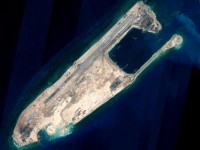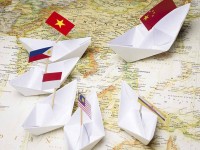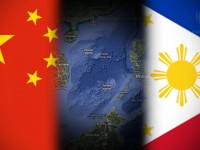Jan 07, 2016
The Chinese government on Wednesday successfully conducted a test civil flight to an airport on Yongshu Jiao of China's Nansha Islands to ensure the safety of the airport for large airliners and provide options for new alternate airfields and more flexible and cheaper transoceanic flight routes.

Shen Dingli, Professor, Institute of International Studies, Fudan University
Jan 05, 2016
Mutual suspicion between China and the US should be dissolved through dialogue and transparency. If China could brief America of Beijing’s reclamation moves beforehand in the future, and the US would abandon its approach of microphone diplomacy, accidents like the 2001 air collision and future conflict should be avoided in both countries’ interest.
Jan 04, 2016
The Philippines says that like Vietnam, it opposes a recent Chinese flight test in a newly completed runway on one of seven islands Beijing constructed in the disputed South China Sea.
Dec 30, 2015
Tensions are rising in the East China Sea after China deployed an armed, former navy frigate for the first time to challenge Japan’s control of contested islands in what may be an attempt to shift Tokyo’s attention away from disputes in the South China Sea.
Dec 29, 2015
The drone prototype will conduct flight tests over the South China Sea in 2016.
Dec 21, 2015
The U.S. should cease sending ships and planes to China’s South China Sea islands, stop showing off its military might and respect China’s core interests, Foreign Minister Wang Yi told Secretary of State John Kerry.

Lucio Blanco Pitlo III, President of Philippine Association for Chinese Studies, and Research Fellow at Asia-Pacific Pathways to Progress Foundation
Dec 21, 2015
Legal fixation on West Philippine Sea islands limits Philippine action and fails to take into account evolving realities and dynamics, notably increasing U.S.-China competition that blurs and shifts alliances, compelling smaller powers to be more cautious and contributing to overall regional anxiety and instability.
Dec 19, 2015
China is accusing the U.S. of a serious military provocation following the flight of an American B-52 strategic bomber over a Chinese-controlled man-made island in the South China Sea.

Wang Hanling, Director of National Center for Ocean Affairs and the Law of the Sea
Dec 14, 2015
While China’s action falls within common international legal practice, Manila’s unilateral pursuit of its claims violates the rule and spirit of its agreements with Beijing on how to resolve such disputes, and threatens the peaceful order of the region. China and other claimants are all developing countries with economic and social uplift as their main task, and should settle their disputes with direct negotiation as outlined in ASEAN agreements.
Dec 09, 2015
China's military is paying "close attention" to an agreement between the United States and Singapore to deploy the U.S. P8 Poseidon spy plane to the city state and hopes the move does not harm regional stability, the defense ministry said.
Back to Top

- China-US Focus builds trust and understanding between the U.S. and China through open dialogue among thought leaders.
- Our Offerings
- Topics
- Videos
- Podcasts
- Columnists
- Research Reports
- Focus Digest
- Stay Connected
-
Thanks for signing up!
- Get the latest stories from China-US Focus weekly.